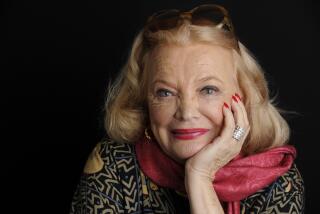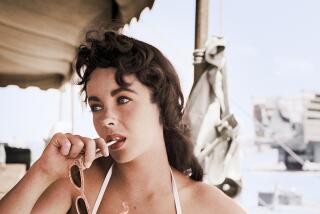M. Lockwood; British Film Actress, Star of ‘Lady Vanishes’
Margaret Lockwood, the calculatingly beautiful vixen featured in a variety of British films and who was named England’s favorite movie star for three successive years in the mid-1940s, died Sunday.
Miss Lockwood, the star of Alfred Hitchcock’s 1938 classic “The Lady Vanishes” and other significant pictures of 50 years ago, was 73.
The Associated Press and the British Press Assn. reported that she died at Cromwell Hospital in London. They both quoted a family spokesman who asked that no details of the cause of death be released.
Made a commander of the British Empire in 1981, Miss Lockwood vied for years with James Mason as the top moneymaking star of British films.
Born in Karachi, Pakistan, where her father was in the colonial service in what was then British India, she trained at the Royal Academy of Dramatic Art. Although she came to be known for her film work, her earliest and last roles were in the theater.
Her first stage appearance, at age 12, was as a fairy in Shakespeare’s “A Midsummer Night’s Dream.” She later appeared in Noel Coward’s “Cavalcade” and made her first film, “Lorna Doone,” in 1934 when she was 18.
Among her nearly 50 other pictures, many of them period melodramas produced at Gainsborough Studios, were “Night Train to Munich,” “The Man in Gray,” “Bedelia,” “Hungry Hill” and the 1945 hit “The Wicked Lady.” In them she often fancied other women’s husbands and murder could suit her purposes.
In “The Wicked Lady,” with Mason, she played an aristocratic woman who joins a highwayman in his life of crime. For her trouble she is horsewhipped and assaulted.
“Once there was a period when no British film seemed complete without her getting severely bruised in period costume by James Mason,” the critic Sheridan Morley wrote last year.
The film was considered daring at the time for the decolletage exposure of her gowns and much of that footage had to be reshot for U.S. release.
Earlier, she had made two pictures in the United States, “Susannah of the Mounties” with Shirley Temple and “Rulers of the Sea” with Douglas Fairbanks Jr., before returning to England with her British broker husband, Rupert de Leon. They later divorced.
Her last film appearance was in 1976 in a cameo role in “The Slipper and the Rose.”
She was featured in the popular 1960s British Broadcasting Corp. series “The Flying Swan,” co-starring with her daughter, Julia, and in a series called “Justice” in the 1970s.
She also enjoyed a rich stage career that ended in 1980 with her role as Queen Alexandra in a short-lived production of “Motherdear.”
Miss Lockwood never remarried, and in her last years lived a modest life in suburban London where she suffered from a middle-ear problem that affected her balance.
More to Read
Only good movies
Get the Indie Focus newsletter, Mark Olsen's weekly guide to the world of cinema.
You may occasionally receive promotional content from the Los Angeles Times.










